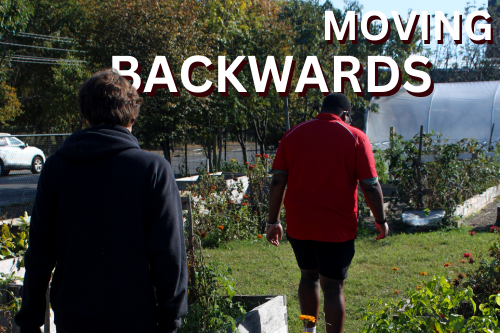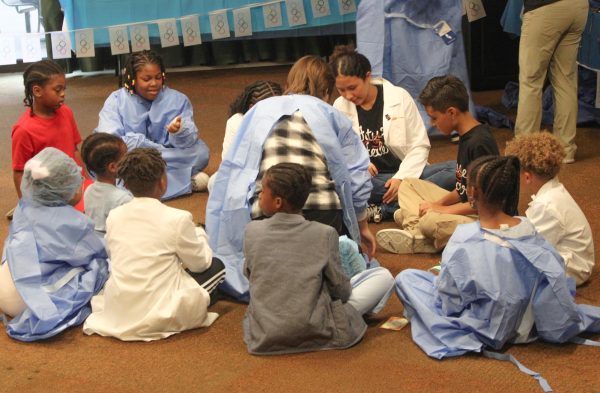Your Local Gov. Guide
Words by Ysa Leon and Maddie Currie
It’s Nov. 6, 2018 — election day. Yikes. Walking up to your voting site, you realize the names you’re seeing are unfamiliar. Divided by parties and levels of power, the letters strung together form titles you don’t understand. You pick up the No. 2 pencil, preparing to exercise your 15th amendment right. You hesitate, unsure of your decision. Who are you placing in power? How much impact will your vote have? Will you make the right choice among the strange names?
What’s the issue?
If you’ve ever experienced this voting anxiety, you’re not alone. Jefferson County had a 61.6% voter turnout in the 2016 Metro Council general election, according to the State Board of Elections. Hundreds of thousands of Louisville citizens stay home or at work on election day for one reason or another.
The Knight Foundation, an American non-profit whose goal is to foster a community of “healthy democracy,” conducted a study to understand why millennials aren’t voting. They found five major obstacles that hinder turnout among young voters: a lack of media coverage, disconnection with local government, government skepticism, disaffection with their city, and confusion with the voting process.
Although we can’t necessarily control local television coverage, there are plenty of actions we can take to subdue voter anxiety. It all starts with our own understanding of what local government is and how it can affect us.
What is local government, anyway?
Although local government can be any particular city or state body, our local city government consists of Democrat Mayor Greg Fischer and those under him that help govern Louisville. Our city government can enforce laws, elect officials, and enact taxes that affect Jefferson County. But Louisville government had to undergo some major changes to reach what it is today.
“In 2003, this whole apple cart was turned on its head,” says Tom Owen, former Metro Council President and current University of Louisville associate archivist and community relations associate, speaking of the 2003 city-county merger.
Until the merger, the “city” of Louisville, only included the then 256,231 residents of what is now “Old Louisville,” but was still under the jurisdiction of Jefferson County. In 2000, a task force consisting of 54 major elected officials (including the Mayor, the 12 aldermen — or elected councilmen — and 29 state legislators) formed with the purpose of creating a merger plan unlike the ones that had failed in the past. Their proposal, House Bill 647, passed through the House and Senate after a few compromising details. The task force decided that it would officially take effect in January 2003 following the 2002 election.
Before the merger, Owen was one of the original 12 aldermen representing 12 districts comprising the legislative branch. These aldermen had similar jobs to our current Metro Council members and worked with a “strong-mayor.”
A “strong-mayor” system defines the Metro Council as the primary legislative body, while the mayor is the city’s chief executive. They work concurrently to achieve their homogeneous goals for the city. We still use this same model of power division in Louisville today.
However, the old organization of government could not last with the new city lines. The new Louisville Metro Council divided the county into 26 districts based on population, according to Owen, each with its own council member.
Today, the Metro Council and Mayor govern Louisville and Jefferson County, which are one in the same, although renamed “Louisville-Jefferson County Metro Government” (aka “Louisville Metro”).
Who’s in charge?
So who have we entrusted our city to? The answer isn’t so simple.
With our strong-mayor system, Mayor Greg Fischer heads the team. Fischer won the mayoral election in 2010, again in 2014, and is currently running for re-election for his third and final term (mayors are limited to three consecutive four-year terms). Mayor Fischer works with the Metro Council to address city and district-specific problems. The council works as the legislative branch; they propose new laws, organize the city budget, and work with city services. You can find what district you live in and your representative by going to Louisville’s government website (louisvilleky.gov) and typing in your address in the district map.
Under the Mayor and Metro Council are the small city mayors that became a part of Louisville Metro after the merger like the Mayor of St. Matthews, Rick Tonini, and Mayor of the City of Hurstbourne, Mary Schneider. These people handle more civil services, like an individual fire department or police force, and work with the Mayor and Metro Council to address issues in their small city. There are also other elected positions that contribute to local government, like the county sheriff or the county clerk, that may not always cross our minds.
Now that you are familiar with the primary positions, we should look at what they do and how their daily duties can affect you.
What do our elected officials do?
On a day-to-day basis, you may envision a lot of meetings and paperwork (which it definitely is), but the work of local government officials goes beyond the typical formalities.
“We’ve chosen to fundamentally reposition the city in terms of where we fit with American cities and global cities. To be known as a city of innovation, an equitable city, a compassionate city, an inclusive city and one that is very economically dynamic as well,” Mayor Fischer told On the Record, “What I do everyday kind of flows down from that.”
With the strong-mayor system, Fischer works alongside the Metro Council to pass or kill legislation.
“They are our legislative partner, so they will come up with concepts that they debate and pass and not pass and we will provide ideas to them from time to time. They are an important partner of the mayor,” Fischer said.
Your Metro Council district representative can address concerns specific to your neighborhood. Any pronounced potholes, sickening smoke, or confusing construction are perfect things to take to your rep. Remember: they are representatives for a reason; representing you is their job! Government officials, especially district reps, work for YOU.
What elections are coming up?
Midterm elections are already underway, with primaries settled and general elections on the horizon. The odd-numbered districts of the Metro Council are up for election, along with our Mayor. Party primaries are set; the mayoral race being Democrat Mayor Fischer and Republican Angela Leet, current District 7 Councilwoman. The Metro Council race for the odd-numbered districts includes a few unopposed candidates, like Democrat Jessica Green (currently in office, District 1), Democrat Keisha Dorsey (District 3), and Republican James Peden (currently in office, District 23).
But what can we do?
Voting in local elections can be confusing, but it doesn’t have to be. By using a search engine on the Jefferson County Clerk’s website, you can easily enter your address and find the closest voting center.
But before you ever reach for the ballot, staying informed is crucial in making a decision. On Ballotpedia, an online political encyclopedia, you can see the number of upcoming elections and the candidates running in them, as well as primary and general election results. Click on any particular candidate and you can view a short biography about their profession, political history, and party affiliate. No matter if you are old enough to vote, you should always stay in the know; local government affects everyone!
“Whatever age you are hopefully you still have that fire to be pushing toward a more perfect union,” Fischer said, “It’s very effective when young people speak out because you can work on your parents and grandparents and really question.”
Fischer says that consistency is key; people who continue to demand action will catch the attention of government officials.
“You all have the ability to be courageous in your conversations and expressions and I really encourage you to do it, ” Fischer said.
If you have a problem within your district or beyond, the Metro Council holds meetings every two weeks. You can arrange to speak through their website, where you can find speaking guidelines and the phone number of the Metro Council Clerk to request speaking time. Contact information for each district representative is on the Louisville Government website, and you can use the district map feature to see who your council member is.
Voting and staying informed on your representatives isn’t the only way you can make a difference in your community. The youth have a voice and it’s a loud one.
What now?
If you are 18 or older, you can register to vote now! Kentucky is one of the 37 states that it offers online voter registration — a few easy questions about your eligibility, identification, and political affiliation and you’re good to go. Head over to the Kentucky State Board of Elections website, make sure you haven’t passed the deadline to register (28 days before the next election), and click on “Register Online to Vote.”
Don’t worry if you haven’t made it to your 18th yet; staying informed is something everyone, regardless of their age, can, and should, start now. It may take some homework, but you’ll feel proactive and, when it comes time, ready to take on the matrix we call local government.«
Donations are collected through The Publishers, duPont Manual High School's booster club for J&C. On The Record relies completely on sponsorships, advertisements, and donations to produce and distribute each issue. Please consider donating to our cause, and helping the student journalists of OTR amplify youth voices for years to come.







